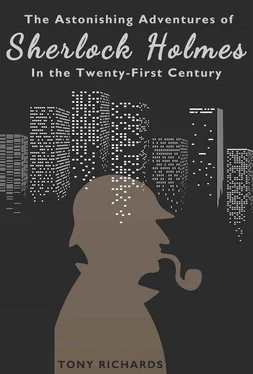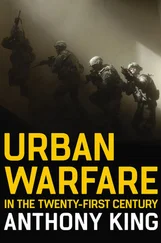Holmes took a few moments digesting that.
Then, “Yes indeed, I think they might have been,” he finally opined.
And he looked around at Charlie Rooker, who pursed his lips and nodded.
* * *
There were two more stops to make. The first was to the record shop on Brewer Street where Raj Noor had been working. They met with his boss, a large and gruff but basically amicable man who assured them that young Raj had been, up until the moment he had inexplicably walked out, a model employee – eager, polite, punctual and scrupulously honest.
“I can’t believe what he’s gone and got up to,” the fellow huffed. “He’s the last person you’d expect to do anything like that.”
“Indeed.”
Holmes noticed that this establishment had its own closed-circuit camera, and asked to see the footage. And on it he found the customers that Raj had been serving before he had embarked on his crime spree.
They were precisely as the suspect had described them: a slim, waif-like young woman and a taller, rather muscular blond man. Raj had been right … they were both Dutch. Holmes could tell that by the brands of clothing that they wore, and a tattoo on the gentleman’s right bicep. By the condition of the pupils of their eyes, they were regular smokers of hashish and, observing the casual, cosmopolitan air they had about them, he had little doubt they hailed from Amsterdam.
They were smiling, mild and pleasant in the way they dealt with Raj. Neither of them once looked grim, or tried to hold his gaze for long. Holmes watched the recording through three times, hoping to pick up something he had previously missed. And was finally left with the conclusion that neither of this couple were responsible for Raj’s misfortune.
Both detectives headed back to Rooker’s Ford Mondeo, which was being studied by a traffic warden with a beady eye.
“Where to now, guv?” Rooker asked.
“I want to see the alley where the lad was found.”
“If he’s responsible for what he’s done, I’ll eat my bleedin’ warrant card,” the police inspector grunted on the way, turning his steering wheel.
“And the rest? The other nine?”
“Exactly the same as Raj. Honest, decent people with no history of any wrongdoing. Each of them shocked, bewildered, with not the slightest memory of what they’d done.”
“But – unless the law has changed a great deal since I’ve been away – that will not save them when they stand before a judge, now will it?”
“No, it won’t.” And Rooker looked exasperated. “I didn’t join the Force to send a bunch of innocent people down.”
They reached the alley, having to push their way through a double-column of Korean tourists to enter it. And it might have been situated behind one of the most salubrious parts of London’s West End, but it was a mightily dingy place. Narrow, crammed in between high brick walls. Damp and slightly malodorous. Barely any light managed to make its way in here. The short lane ended at a graffiti-scribbled wall, with a loosely grouped collection of large plastic refuse bins beside it.
“Those were checked for the stolen jewellery?” Holmes asked.
Charlie Rooker glanced back at him somewhat crookedly.
“I may not be a great detective, Mr Holmes,” he pointed out, “but I’m not a bad one either.”
“No, of course not,” Holmes said quickly. “I meant no offence. It’s just that …”
He pivoted around, gazing at his grim surroundings with a look of utter disbelief.
“Why would young Raj wind up here? No, none of this makes any sense.”
* * *
Maybe the officials at the Home Office considered it appropriate, but they had rented him a suite – at Her Majesty’s expense – at the Sherlock Holmes Hotel on Baker Street, not too far from his old flat. The area had changed somewhat, but he was not displeased. His rooms were sumptuous. The staff were courteous to a fault. And he was able to revisit an old habit he had not indulged in for a good few decades.
When had he lost his lovely Meerchaum pipe? He couldn’t quite remember. It had dropped out of his pocket somewhere, either during a fistfight with a Gestapo thug in Berlin, 1944, or while he’d been in hot pursuit of a terrorist chief in Marrakesh. But now he was able to visit the hotel’s gift shop and buy an exact replica. A second visit to a nearby tobacconist provided him with the correct material with which to fill it. They still stocked his old brand, albeit that the packaging had changed. And now he was sitting in the largest of his rooms, puffing contentedly away. The hotel’s management had already had the foresight to disable the suite’s smoke alarms.
Should he buy a violin as well, perhaps? No, how would he transport it when he left here? And as for his predilection for cocaine – well, that was a very seedy matter these days, and would involve riding to nearby Camden Town and hanging about on dank street corners with a bunch of petty criminals. So he contended himself with ordering up the tallest glass the staff could manage of pina colada.
He switched on the television, gazed bemusedly for a few minutes at something that called itself a ‘talent show’, then grunted and switched it off. The way that he puffed on his pipe became far less contented, more disgruntled as he worked the case through his mind all over again.
He had believed at first these crimes might be the result of some form of hypnotism. He had come across such instances before. But the way that Raj Noor had described his hideous experience … it sounded like no form of hypnotism he had ever come across. And besides, there appeared to have been no attempt made to enslave the poor lad’s mind in the first place. He had already established that.
Perhaps he ought to go back to the station house and question some of the other suspects? But Holmes already felt quite sure that they would tell him the same story.
There was something really quite appalling going on here. And it was not the work of any ordinary man. Why pick on people who were utterly blameless? How could they be made to suddenly appear inside a jeweller’s, a safe deposit vault, a bank? And why did people believe that they had a gun when no weapon existed?
The natural laws, both physical and mental, were being tampered with quite dreadfully in this particular case. And he couldn’t imagine what kind of being had the kind of power to do that.
Holmes sank back in his chair and puffed and pondered until almost dawn. Occasionally, a glowing ember would come flying up and burn a small hole in his jacket, but he didn’t even notice that.
* * *
Three more days saw three more crimes, each of them so strange that they made the front pages of most of the national newspapers. A Polish au pair on her second week in town entered the Belgravia home of a publishing millionaire, terrorising the man’s family and making off with several hundred thousand pounds in jewellery and cash. A promising law student, just nineteen years old, went into the British Museum, threw a brick through a display case, and took several priceless Egyptian relics. And a newsvendor in his mid-forties – a cheerful man, well liked by the people in his area – suddenly appeared in the vaults of the Krigge-Schumann Bank in Knightsbridge. When he disappeared again, a number of gold bars went with him.
What might happen next? The atmosphere out on the streets grew noticeably worse. The whole metropolis was slightly panicked.
Each of the perpetrators was apprehended swiftly and with not the slightest resistance. Each was in a state of profound shock. Holmes interviewed them carefully. And, as he’d expected, their stories were all precisely the same as Raj Noor’s had been: they’d gone outside their bodies, and had not been the slightest bit aware what they’d been doing.
Читать дальше












